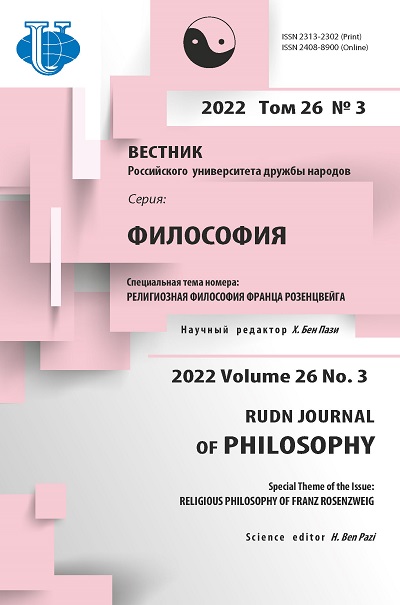How social ontology is possible from the point of view of epistemology and philosophy of language?
- Autores: Antonovskiy A.Y.1, Barash R.E.2
-
Afiliações:
- Moscow State University named after M. V. Lomonosov
- Russian Society for the History and Philosophy of Science
- Edição: Volume 26, Nº 3 (2022): RELIGIOUS PHILOSOPHY OF FRANZ ROSENZWEIG
- Páginas: 607-622
- Seção: SOCIAL ONTOLOGY OF B. EPSTEIN AND ITS CONTEMPORARY INTERPRETATIONS
- URL: https://journal-vniispk.ru/2313-2302/article/view/325312
- DOI: https://doi.org/10.22363/2313-2302-2022-26-3-607-622
- ID: 325312
Citar
Texto integral
Resumo
The article critically examines the project of Brian Epstein's social ontology. The authors propose to interpret a social fact as derived from the appropriate perspective of an observer carrying out a structural reconstruction of a social phenomenon and identify difficulties in the way of analyzing social facts as structurally independent of causally determining factors. The article shows that the determination and foundation of social facts cannot be understood as asymmetric, substantiates the symmetrical nature of the relationship between the determinable complex fact and the ontological foundations that determine them, and suggests that the judgments describing them are equivalent, and also proves the need to involve philosophical and scientific methodology, the resources of the philosophy of language and epistemology to address the issue of the validity of projects “ontological fixation”, which the authors of the article propose to consider as a scientific classification. Understanding the ontology of the social is possible only when going beyond its limits, and any classifications can be idiosyncrasies of individual classifiers or observers, scientifically unequal and requiring epistemological evaluation. The authors note that epistemology allows us to judge the necessity or, on the contrary, artificiality of classification, and the question of the ontological basis of a social fact should be solved by analogy. Accordingly, the search for such ontological foundations is not possible without prior resolution of the epistemological problem: which classifications (fixations) of “natural” or “social species” are structurally necessary (in the sense that their macro-properties properties stem from the internal structure), and which are arbitrarily constructed by the observer, based on his idiosyncrasy or local-historical, cultural or ideological position.
Palavras-chave
Sobre autores
Alexander Antonovskiy
Moscow State University named after M. V. Lomonosov
Autor responsável pela correspondência
Email: antonovski@iph.ras.ru
ORCID ID: 0000-0003-4209-8213
Leading Researcher, Institute of Philosophy, Russian Academy of Sciences; Professor, Lomonosov Moscow State University
1 Leninskie Gory St, Moscow, 119991, Russian FederationRaisa Barash
Russian Society for the History and Philosophy of Science
Email: raisabarash@gmail.com
ORCID ID: 0000-0002-5899-973X
Leading Researcher, Institute of Sociology of the Federal Scientific Research Center of the Russian Academy of Sciences; Researcher, the Russian Society for the History and Philosophy of Science
building 2, 1/36 Lyalin lane, Moscow, 2105062, Russian FederationBibliografia
- Durkheim E. Les Règles de la méthode sociologique. Paris: Les Presses universitaires de France; 1894.
- Hesse M. Models and Analogies in Science. Notre Dame: University of Notre Dame Press; 1966.
- Harré R. The Principles of Scientific Thinking. London: Macmillan; 1975.
- Weber M. Die protestantische Ethik und der Geist des Kapitalismus. Archiv für Sozialwissenschaft und Sozialpolitik. 1904;(20):1—54; 1905;(21):1—110.
- Coleman JS. Weber and the Protestant Ethic. A Comment on Hernes. Rationality and Society. 1989;2(1):291—294.
- Place UT. Identifying the Mind. New York: Oxford University Press; 2004.
- Smart JJC. The Mind/Brain Identity Theory. In: The Stanford Encyclopedia of Philosophy. [First published Jan 12, 2000; substantive revision May 18, 2007]. Available from: https://plato.stanford.edu/entries/mind-identity/
- Epstein B. A Framework for Social Ontology. Philosophy of the Social Sciences. 2016;46(2):147—167.
- Kripke S. Wittgenstein on rules and private language: An Elementary Exposition. Cambridge (Mass.): Harvard University Press; 1982.
- Borges HL. Analytical language of John Wilkins. In: Philosophy of Philosophy. Texts of Philosophy. Moscow: Akademicheskii proekt; fond “Mir” publ.; 2012.
Arquivos suplementares








